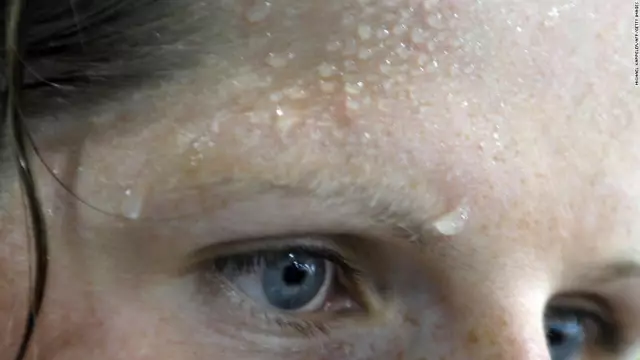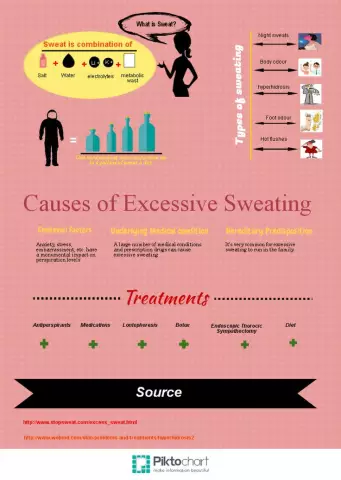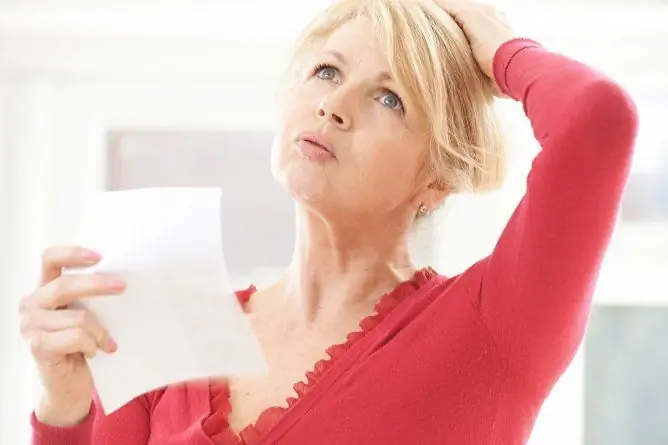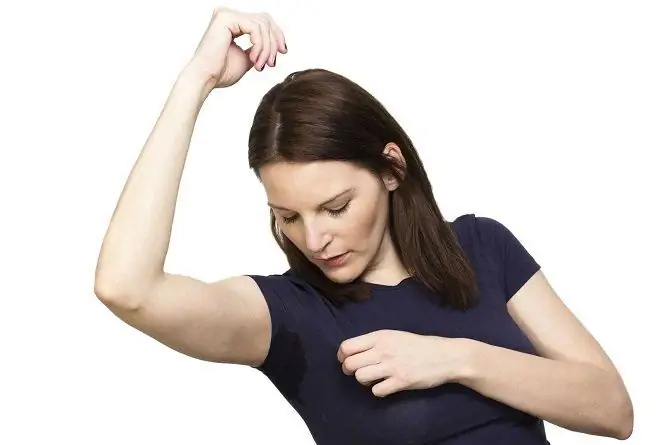- Author Rachel Wainwright wainwright@abchealthonline.com.
- Public 2023-12-15 07:39.
- Last modified 2025-11-02 20:14.
Sweating during menopause: how to fight?
The content of the article:
- Signs of hot flashes
- Causes of sweating with menopause
- Diagnosis of hyperhidrosis
-
Sweating treatment
- Lifestyle
- Hormones and phytoestrogens
- Other means
- Prevention
During menopause, women often suffer from excessive sweating, frequent hot flashes, and general discomfort. How to get rid of these troubles, what are the causes of their occurrence, what remedies exist for the treatment of hyperhidrosis, is described in our article.

Signs of hot flashes
These are unexpected bouts of warmth, characteristic only of menopause. At this time, hot waves cover the body from the inside, and the skin turns red and becomes hot. The heartbeat increases, it begins to feel unpleasant in the chest, and blood pressure rises. Blood rushes to my face. The body is drenched in sweat, but at the same time the mucous membranes, especially the female genital organs, dry out. As the tide subsides and cools down, a chill sets in.
In this case, hot flashes can occur up to several dozen times a day. Depending on the frequency, their severity is classified:
- A mild form of menopause - up to 10 attacks per day.
- Climax of moderate severity - from 10 to 20 per day.
- Severe menopause - over 20 attacks per day.
Unfortunately, the severe form occurs in about one in two women who have reached menopause, which means it is most likely that a woman will experience more than 20 hot flashes a day. A third develops a moderate menopause, and every sixth has a mild form.
Regardless of the severity, hot flashes most often occur in the morning and evening. Morning usually bothers between six and seven in the morning. Evenings stretch between 7 pm and 10 pm. Of course, they can happen at other times, and some women are worried about nighttime, which interferes with sleep. In general, about 70% of women in menopause experience hot flashes. They themselves usually last no more than half an hour, and can take only half a minute.
Hot flashes can occur not only in the transitional period of menopause, but also as a result of chemotherapy or surgical removal of female genital organs, since it is the changes in the hormonal background that lead to menopause.
Causes of sweating with menopause
During hot flashes and even outside of these attacks, hyperhidrosis, excessive sweating, can be observed. Menopause sweating is caused by several internal and external factors:
- Hot flashes;
- Warm tight clothing made of non-breathable fabrics;
- heat and stuffiness, hot and spicy food, warm baths;
- Exhausting diets;
- Moving, changing jobs, in itself an age-related change in the lifestyle, associated stresses;
- Chronic fatigue.
Moreover, the attacks of hyperhidrosis themselves cause stress and anxiety, which is why sweating increases. Sweating is a problem in itself, because it provokes an unpleasant smell for others and embarrasses a woman, increases the risk of colds, leads to skin irritation.
Night sweats can significantly impair the quality of sleep and aggravate anxiety, even provoke climacteric neurosis. Ultimately, this can lead to decreased immunity, disorders of the cardiovascular system, depression.
Diagnosis of hyperhidrosis
To determine the cause of the disease and associate it with menopause, other options should be excluded. Among them may be thyroid disease, panic attacks, early ovarian atrophy, prolactin tumor and others.
To diagnose them, you will need blood and urine tests. You will also need to go to specialist doctors: endocrinologist, neurologist, cardiologist, gynecologist.
To diagnose hyperhidrosis and exclude non-climacteric causes, the following tests are needed:
- Luteinizing hormone (LH), which is elevated during menopause;
- Estradiol, which, on the contrary, is lowered;
- Follicle-stimulating hormone (FSH) levels in blood and urine
- Ultrasound of the pelvic organs;
- Mammography;
- Vaginal smears and histology of the uterine mucosa;
- Registration of changes in body temperature.
Since excessive sweating can cause not only menopause, as well as the symptoms of menopause can be characteristic not only for the corresponding age stage, you should consult a doctor at the first doubts about your health. Otherwise, it can lead to undesirable consequences.
Sweating treatment
The first thing to think about when treating hyperhidrosis is changing and optimizing lifestyle, improving hygiene. Only this can be followed by drug therapy.
Lifestyle
Adequate exercise can help strengthen the body and increase endurance, thereby reducing the response to physical and emotional stress. It is also important to reduce the intake of coffee, strong tea, alcohol, the use of a large amount of seasonings, especially spicy ones - and instead increase the intake of fermented milk products and fruits, vegetables, nuts, and fatty fish. Smoking is also not recommended.
If you are overweight, it can be beneficial to keep it down, as the amount of fat affects the production of heat, which means hot flashes and sweats. Synthetic clothing also contributes to overheating, and natural fabrics are recommended for free breathing and cooling the body.

To compensate for problems associated with sweating, personal and home hygiene should also be improved. Choose a strong, long-lasting deodorant that is odorless if possible so that it does not irritate others. You can and should wash several times a day, at least in the morning and before going to bed, also after work or, if you are leading a household, in the middle of the day. It is equally important to wash your hair to keep your hair clean, otherwise its smell and appearance will deteriorate, and painful microflora may develop on the scalp. It is also advisable to change bed linen and clothes more often, and use breathable natural fabrics.
Vitamins and minerals are also needed to support the health of the body. During menopause, vitamins of group B are especially important, in particular B6 and B12, as well as vitamin D and calcium necessary for its assimilation, as well as magnesium.
Hormones and phytoestrogens
If the attending physician considers it necessary, he will prescribe the necessary hormone replacement therapy. That is, she will prescribe medications that compensate for the lack of natural hormone production with age.
Some plants contain substances similar to the effects of female sex hormones - estrogens. So, soy isoflavones have an estrogen-like effect.
Phytoestrogens are contained in the dietary supplement Flavia Night. This supplement also contains B vitamins (B6 and B12), vitamin D, calcium and magnesium, and several other beneficial nutrients. Melatonin in Flavia Night helps to normalize sleep, as this substance is a natural regulator of the sleep and wakefulness cycles.

Other means
Sedatives can also be helpful. Tincture of rhizomes with valerian roots or motherwort root can help relieve anxiety and sweating. However, herbal preparations are not prescription and do not require a doctor's prescription. If the doctor finds a need for more serious drugs, he will prescribe them.
In addition to valerian and motherwort, you can use mint, lemon balm, sage, chamomile, linden. So, from mint and lemon balm, you can brew teas at the rate of a few leaves per glass of boiling water. Sage can be infused in hot water for an hour at the rate of two tablespoons per glass. Linden flower tea perfectly relieves sweating. Chamomile bath and chamomile tea relieve anxiety.
Prevention
For prevention, as well as for treatment, lifestyle should be optimized. First of all, you should consult a doctor for preventive advice and the appointment of routine tests that will show all the risks and the need for treatment.
It is also important to minimize stress associated with work, family, and everyday life. Perhaps a change of job or even moving to a household will help, or a move may be required. Moderate exercise can increase endurance and in the future will only allow you to sweat under much greater stress than without preparation.
A vegetarian or similar diet can also help prevent the development of hyperhidrosis and other unpleasant symptoms of menopause. So, it is recommended to consume legumes and cereals, replace animal fats with vegetable oils (you can leave it in the diet or add fatty fish to it). Cabbage, flaxseed and sesame seeds, spinach, asparagus, carrots and garlic improve digestion and prevent gastrointestinal problems, which can also include sweating and foul sweat odor. Red grapes improve the functioning of the cardiovascular system, which means that it reduces the body's need to remove excess fluid through sweat. It is better not to throw away grape seeds, as they contain the highest concentration of nutrients. Corn, oats and rye, wheat germ will also be beneficial.
Vitamin and mineral supplements and other dietary supplements help prevent, delay, or relieve future menopause symptoms, including sweating. As in the treatment, vitamins of group B (B6, B12), vitamin D and calcium, magnesium will help. Also, external intake of phytoestrogens, such as soy isoflavones, compensates for the lack of estrogen production with age. Therefore, you can use the dietary supplement Flavia Night with menopause both to help in treatment and to help in prevention.
A competent approach to prevention and treatment, a timely visit to the doctor and quality lifestyle changes can not only relieve hot flashes with menopause and hyperhidrosis, but also help get rid of them completely. All it takes is to make an effort. And doctors, physical education, phytoestrogens and vitamins will help you with this.
Found a mistake in the text? Select it and press Ctrl + Enter.






